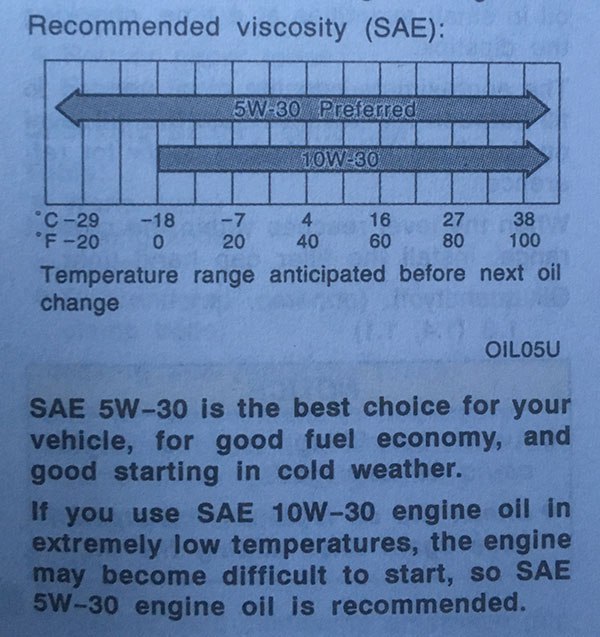Should I Switch to a Lighter Viscosity Oil in Winter?
Motorists sometimes ask if they should use a lighter viscosity of motor oil once winter arrives.
Yes – provided your vehicle manufacturer allows it.
Run out to your vehicle and fish the owner’s manual from the glove box. Or open a digital copy on your phone.
Somewhere in the back you should find the motor oil recommendations. Many vehicles, particularly domestic, call for a lone viscosity of motor oil. It’s likely 5W-20 or 5W-30. That’s what you’re supposed to use all the time. Doesn’t matter if it’s -20ºF (-29ºC) or 100ºF (38ºC) outside. The engine was designed and manufactured to operate most efficiently using that particular viscosity of motor oil.
But some vehicle manufacturers – often foreign – recommend different motor oil viscosities depending on ambient temperature. You may find a chart in the owner’s manual like the one below that shows which viscosity you can use depending on the temperature. The manufacturer typically recommends a lighter viscosity when the temperature drops during the winter.
In this case, we recommend using the lightest recommended viscosity during the winter.
Why?
Two reasons:
- Maximum wear protection at startup
- Easier cold starts
To understand, you have to understand motor oil viscosity. If you’ve navigated to this page after a Google search, you probably know something about viscosity already. But a little refresher can’t hurt. (Check out this post for a detailed explanation of viscosity.)
Viscosity refers to the oil’s resistance to flow and is its most important property. The lower the oil’s viscosity, the more readily it flows at cold winter temperatures. Of course, the opposite is true – the higher the oil’s viscosity, the more slowly it flows when cold. That means an 0W-20 oil will flow better when it’s cold than a 10W-30.
Dub-ya
Which brings me to my next important point.
The oil’s “W” viscosity describes its characteristics when it’s cold. And by “cold” we mean 40ºC (104ºF). The second number (e.g. the “30” in “5W-30”) describes the oil’s characteristics once your engine reaches normal operating temperature, or 100ºC (212ºF).
Engineers agree that most engine wear occurs at startup. One reason is because gravity pulls much of the oil into the sump as the vehicle sits overnight.
When you start the vehicle the next morning – even if it’s not that cold outside – a few critical moments pass before the motor oil travels through the oil pump and navigates the narrow oil passages to reach components throughout the engine. It’s during those moments that accelerated wear can take place.
As such, it’s beneficial to use an oil that flows readily at startup to reach engine components as quickly as possible.
Since lower-viscosity oils flow more readily, they provide better cold-weather startup protection compared to higher-viscosity oils.
Crank it up
Lower-viscosity oils also provide less crankshaft resistance as the engine turns over. When the temperature plummets below zero, the motor oil can thicken so much that it prevents the crankshaft from spinning fast enough to start the engine. This is particularly a problem with conventional oils since they contain waxes that thicken in the cold. Synthetic motor oil, in contrast, doesn’t contain waxes and, therefore, provides easier cold starts.
Check out the video to see for yourself.

Along the same lines, oil that provides less resistance to moving engine parts also maximizes fuel economy. That’s the primary reason automakers are trending toward lighter viscosity oils in their new vehicles.
A word of caution…
It’s important to note that using a higher-viscosity oil does have its benefits, too. Higher viscosity oils tend to provide improved wear protection since they promote formation of a thicker fluid film on engine parts. They’re also more resilient to oil consumption than lighter viscosities.
Bottom Line: Switch to the lightest viscosity oil your vehicle manufacturer recommends in the winter. Doing so maximizes wear protection at startup while improving cold-weather starts.







